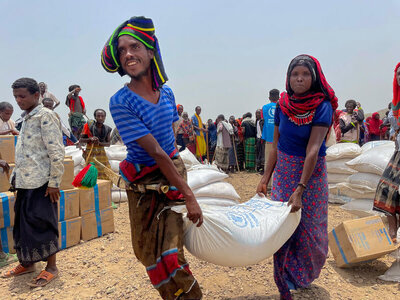Ethiopia
- 6.8 million
- people earmarked for WFP support in 2025
- 55%
- of all children aged under 5 are malnourished
- 129.7 million
- population
Ethiopia has made important development gains over the past two decades, reducing poverty and expanding investments in basic social services. However, food insecurity and malnutrition are at alarming levels.
Multiple and often overlapping crises have severely weakened the ability of communities to cope with shocks, pushing millions of people into severe need and destitution. Recurrent conflict, droughts, diseases and inflation continue to drive humanitarian needs upwards, particularly in regions where productive assets and livelihoods have been eroded already because of protracted shocks.
The overlap of high malnutrition rates, severe water scarcity coupled with disease outbreaks (malaria, measles and cholera) and livestock emergencies have exacerbated food insecurity in the country, leaving millions of people to depend on humanitarian assistance for survival.
Those needing food assistance include people forced from their homes due to the 2020-2022 conflict in the north, severe drought in the south and southeast, and increased seismic activities and earthquakes along the Ethiopian Rift Valley.
The World Food Programme plays a critical role in providing life-saving food assistance to vulnerable people in drought and conflict-affected areas, and works with communities to improve nutrition and build resilience. However, major funding shortfalls are leading to cuts in the assistance we are able provide.
What the World Food Programme is doing in Ethiopia
-
Food security and nutrition
-
WFP provides unconditional food and cash transfers to the most vulnerable families across the country. In the northern Afar, Amhara and Tigray regions, WFP supplies food to people who have been uprooted or otherwise affected by conflict – alongside federal and regional authorities and NGO partners. In Somali Region, WFP also provides emergency food and cash assistance to families affected by severe drought. WFP supports children and pregnant women with malnutrition treatment and prevention activities each month, including fresh-food vouchers.
-
Climate action and early-warning systems
-
Refugees
-
School meals
-
Social protection
-
Supply chain
Ethiopia news releases
Go to pagePartners and donors
Find out more about the state of food security in Ethiopia
Visit the food security analysis pageOperations in Ethiopia
Contacts
Office
Woreda 02, Bole Subcity, Ring Road opposite the cargo terminal PO Box 25584, Code 1000
Addis Ababa
Ethiopia







